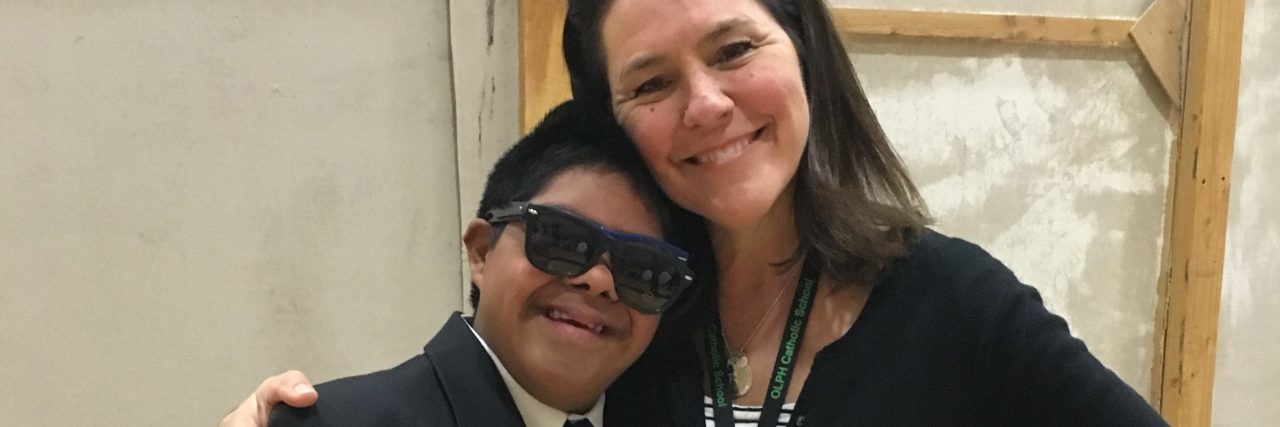Approximately 10 years ago, I was in an IEP meeting when an older gentleman (I use that term loosely) stood up angrily and said to me, “How dare you question me! I am the expert and I know all about these kids.“
The kicker? He was the school psychologist.
He added, “I have read his file.” He thought and was fully convinced that he knew more than I did, about my own child. Sadly, he had never even bothered to meet my child.
You might discard that story, saying to yourself, “That was 10 years ago, things have changed.” But this past weekend, I spoke with another parent who ran into the same situation just last week. She had educators telling her the same thing — that they are the experts.
They are not the experts on your child. You are.
This isn’t to suggest that teachers are horrible and we shouldn’t listen to them. Many teachers are knowledgeable, supportive allies. This is meant to empower parents, and to acknowledge that none of us know everything and everyone has an important part to play. But you, the parent, have the most important voice at that table.
At an IEP meeting, you, the parent, are the expert in the room. You know what your child needs, and you have the most valuable insight at that table.
You know your child best!
You know what they like, and you especially know what they dislike.
You know what their favorite foods and meals are, and what foods they won’t even touch.
You know which restaurants they love, and which ones are too loud and overwhelming.
You know what music and movies they love to watch and dance to.
You know what makes them laugh.
You know what makes them giggle.
You know what motivates them.
You know which stories to read to them at night before they go to bed.
You know how best to hug them, touch them and show them they are loved!
You are their parent.
You are the voice for your child.
You are the CEO of your child.
You are the expert in the room.
I once had an elementary teacher say to me, “He doesn’t even talk! How do you expect him to learn?”
Thankfully I had the right words at the time, and calmly responded saying, “Just because he doesn’t speak, doesn’t mean he doesn’t understand. When he is comfortable and confident, he speaks just fine.”
Her eyes opened wide and I could tell in that moment she felt bad that she had completely underestimated my son. I went on to tell her how he sings from the time he gets off the bus until he goes to bed at night. And how he knows the majority of words to every Barney song as well as the Wiggles. She listened with eyes wide open, now having a true glimpse of my son and a few of his abilities.
They are not the experts.
You are.
As a parent of a child with a disability, we go to outings with other families who have loved ones with disabilities. It may be a play date or a fundraiser. It may be a walk event or even a pool party. It may be a Special Olympics sporting event. But we all realize that while we are there, we are gathering information. We are asking questions of other families. We are watching other children. We are filing away knowledge and resources to help our own children.
So the next time the special education teacher says to you that she has a ton of experience with children with disabilities, acknowledge she may, or may not. Does she realize that not all children are the same, regardless of their diagnosis?
Does she have an open heart to see your child’s talents?
Know that your network likely is bigger and broader than her own. That you have a Down syndrome association/s to turn to, within your own community, to go to for help if needed. That you may be on Facebook groups where you can ask a question and have multiple answers within a few hours. That you can be the resource for the resource, to find the tools and methods needed.
An IEP meeting shouldn’t be a competition, to see who has the most expertise. It should be a team effort.
Yes, experts need help too. Everyone plays a valuable part.
We should all be working hand-in-hand, sitting at the table together.
We should be focused on one goal — my child.
We should be creating the best learning atmosphere for my child to succeed and grow.
We should be giving grace to each other as we try new things and acknowledge there is a learning curve involved.
We should be open about what success and failure look like.
We should be honest about the struggles we will have.
We should be gathering the tools and resources that my child needs to access the general education curriculum, and ensuring they are around typical peers.
We should be working to ensure that my child is a valued part of the classroom.
We should be working to ensure my child is accepted into the school culture.
We should be excited about the potential my child has!
Teachers, please help be an invaluable part of ensuring this child belongs and feels included.
Parents, be the expert in the room, to ensure your child and family are a valued part of the community.

